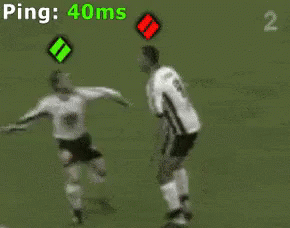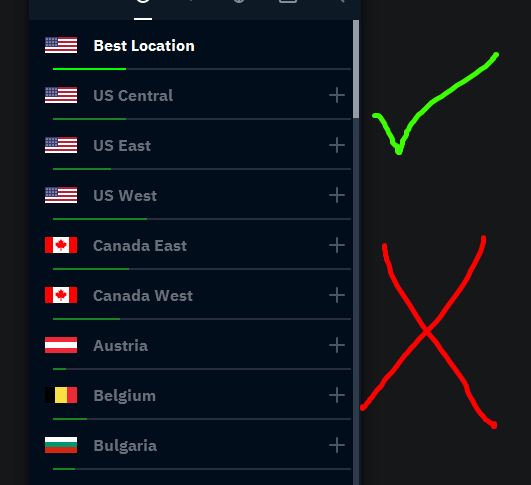There has been a long-standing debate about whether or not you should use a VPN service for gaming, and it's even turned into a subsection of the market in the VPN industry. Some services tailor their product and marketing to the gaming community and make bold promises for the best experience; in reality, many of them are the same or similar products already offered by many commercial services. The reality of VPNs and gaming is more than just the marketing, and there are drawbacks and benefits of using one for your far-too-late-night gaming sessions pwning n00bz. Here, I take a deeper look into what Ping is, and the potential ways using a VPN service while gaming can affect your experience - both positively and negatively!
Networking 101

The internet is magical. Every single action you take, be it a face-roll of the keyboard, or a button mashing of a controller, has to go from your PC/console to your router, then out to your ISP, then through networks of multiple routers belonging to multiple ISPs, before finally reaching the destination server, (phew), and then this has to be sent back to you through the same paths. All of this happens in less time than it takes for you to blink, and it happens multiple times per millisecond. It's truly incredible when you really think about it.
We call the time it takes do all of this your 'round-trip-time' (RTT), also known as latency or ping. Because of the hyperspeed of the internet, we measure RTT/ping in milliseconds. The higher the RTT, the more time it takes for the server to register your action. You can measure ping by opening a terminal window on your PC and typing "ping windscribe.com" - you can use other domains or IPs as well:

As you can see, it takes my computer anywhere from 12-13ms to send a packet to windscribe.com and get a response back. This is my average latency for most services that are geographically close to me.
For your router and ISP to know where to go, it connects to the wider internet, which comprises multiple ISPs and routers that are all connected to one another. They all work together to determine the best route from you to the destination. We define this as the Border Gateway Protocol (BGP) in the networking world. You may have heard of this when Facebook wiped their routing table, causing a global outage.; it may be fragile, but it's how we exchange routes and maintain global reachability. Without it, a network would be lost in space with nobody to reach out to.
Factors That Affect Latency
Even though we've made the internet incredibly robust, there are still many factors that can affect your latency when connecting to a service.
Type of Connection
The most important is the type of connection your ISP provides you. Depending on where you are, there can be a few different types:
- Fiber: This is the most preferred option. Fiber uses light signals to transmit data, making it much more resilient and less prone to signal degradation by distance, and it's resistant to electrical interference since it's not made of anything conductive.
- Copper/Coax: This is the most widely used form of internet cabling, but there's quite a lot that can go wrong here. For starters, the copper must travel from your house to a fiber node or your ISP's building, which causes data signal degradation. While this is true of all cabling to an extent, it is most impactful with copper. Copper is also vulnerable to electrical interference, which again leads to signal degradation.
- DSL: This is another common form of internet access that uses telephone lines, but it is also quite vulnerable, having much the same issues with signal degradation via distance or electrical interference as copper does. On top of that, it tends to have much lower bandwidth than other options.
- Cellular: Pretty self-explanatory in that this method uses cell towers to transmit data. While it is a super convenient form of internet access, the wireless nature means latency can have a bigger impact. I've noticed it is around 20-40ms minimum on my device, but it can go as high as 900-1200ms.
- Satellite: This beams your internet data to SPACEEEEE!!1!!11!!! and back to the ground again. While this can work in remote regions without cell service, it's about as reliable as North Korea's news coverage, with your average latency sitting above 500ms. With SpaceX Starlink, that latency is planning to be reduced drastically, but it's not out of beta just yet.
Distance
Your distance to an internet exchange point and the destination server also plays a huge role in your latency. For example, if you're connecting to European servers from the United States, there is more cable, more ISPs, and longer distances for data to travel through, leading to higher latency. So for best results, you should always connect to servers that are geographically close to you.
Routing

Bad/unoptimized routes from your ISP also slam the brakes on good latency, even if you connect to the location closest to you. If you live near a dedicated server farm that hosts the game server and notice that you have higher latency than normal, try seeing if you can find the server IP and run a traceroute. If you notice you are being bounced across the country and back, that is bad routing. Unfortunately, in most cases you will not be able to control bad routing from your ISP level, but we'll cover what to do to take a detour, don't you worry.
Beware the Marketing Speak
If you've been researching, you've likely come across gaming-oriented VPN services like ExitLag and WTFast, that make bold promises on the eradication of latency using specifically tailored systems. The reality, however, is that these promises are dripping with marketing speak, and rather than these services being revolutionary, they're actually in many ways describing a stripped down VPN service. While these services might work for some, all they really do is redirect your connection in games to a different server, just as any actual VPN would, but without the wider protections and privacy a full VPN provides.


The type of marketing speak seen above is farcical - if a 'VPN' is shifting around your internet traffic in games how could it NOT change your IP address? If your connection to the game is coming from a server rather than your own computer, the IP address will be different – that's just how the internet works! Don't even get me started on how much of a shameless data farm these things are:

So if it's mostly just hot air, how are these services so popular? Could it possibly be because popular Twitch/YouTube influencers get caught in their affiliate programs that pay to unrealistically hype them? Say it ain't so!
That's not to say these services don't do anything or help anyone, and it's possible they could help with your bad connection. All I'm saying is the marketing is extremely overhyped and trying to sound like it does all of these magical things, when in reality it does not; worse, if you already have an optimized connection, these services will do literally nothing to improve things. Maybe this is already apparent to you; after all, it's not like shady market speak is a new thing.
Ways a VPN Can Actually Help
If you can avoid the marketing traps, there are legitimate reasons to use a VPN like Windscribe when gaming. It can be beneficial to your security and privacy, and in some cases provide a better experience.
IP Masking

If you are playing a game that relies on peer-to-peer connections to host lobbies, such as GTA Online or older Call of Duty titles, the host and players can all see your IP address by using either a cheat, or network monitoring tools like Wireshark. They can then determine your approximate geolocation, DDoS you, or, if they are dedicated enough, probe your IP for open ports/servers and try and attack them to gain access to your network.
When using a VPN, however, players will only be able to see the IP belonging to the VPN server, keeping your home IP safe from the prying eyes of script kiddies, and you're free to do all the trash talk like it's the good ol' days of Modern Warfare 2 lobbies all over again.
DDoS Protection

If someone wants to be a total jackass, they can launch a DDoS attack against your connection. Traditional home routers cannot absorb all this traffic, and it will bring your connection to its knees. You better hope that your IP is dynamic and can change after a reboot.
If you're running a VPN service, however, all that traffic will be absorbed by the VPN server, and because of that your actual connection is not affected. If it manages to bring down the VPN server, all you have to do is reconnect or switch locations and you're back in business.
Better Routing

Let's say you were in that group where you have terrible routing to geographically close game servers. By connecting to a VPN, you might be able to take a special detour, routing around the problem at your ISP or wider internet level. This could possibly lead to a more stable connection or ping reduction. While this isn't likely to happen every time, a VPN is always worth a shot if your ping is abnormally high to game servers close to you.
Possible Drawbacks
It's not all sunshine and rainbows, though, and there are some drawbacks that can occur if you intend to get your game on with your trusty VPN service. If these reasons get in the way, it might be better to split tunnel, or disconnect from the VPN server to play your games.
Latency

If you connect to a VPN server that is not the most optimal or closest to you, your ping will be affected. Your latency to a VPN server should be no more than 25-30ms for the best possible outcome, and you should expect at least some minor increase in your ping unless your ISP routing was bad and you are using a VPN to bypass it.
VPN Blocks

While not prevalent in every game I've tried, there may be some games that make VPN usage problematic. If this is an issue, try connecting to other locations. Windscribe has many, and there's a chance not all may be blocked. If nothing is working, you may have to forego the extra layer of protection.
There may also be some cases where we can work around this. If you think so, hit us up (Discord, Reddit, Windscribe Support) and we can take a look.
Optimization Tips
While we can't optimize your gaming skills, we can definitely provide some tips to make your gaming experience better, both on and off a VPN.
Use Ethernet, Avoid Wi-Fi

The most obvious and likely best tip we can offer is that you should always use an Ethernet cable and go wired when gaming. Even if you are close to the router, Wi-Fi can be very unreliable and is prone to packet loss, jitter, and increased latency. This is likely to be amplified further if you're playing using a VPN service.
But what if you're not Bob The Builder and can't drill holes to run some cable? Well, you might be in luck. There are a couple of alternative options, such as powerline and MoCA adapters.
Powerline adapters will use your existing electrical wiring to carry those sweet data packets. There are drawbacks, however - if your dwelling is not modern or is wired like a Christmas tree, its reliability will be affected. If you go this route, try to keep your adapters on the same breaker if you can. Also, maybe don't try to use the microwave or vacuum cleaner while browsing/gaming.
Alternatively, MoCA adapters will use any coaxial wiring in your house. This is far, far, FAR better than relying on your electrical wiring. This type of adapter can usually carry a full gigabit line with almost no performance and/or latency dropoff. Give it a shot if you've got coax wiring you aren't using.
Use The Closest Locations

You should always pick VPN server locations and game servers that are geographically close to you, reducing the possibility of distance based shenanigans, and likely giving a better experience. Your aim should be for it to have the least impact on your latency. So, for example, if you're in the eastern part of the US, you should try the 'US East' locations first, or try what our apps recommend as the 'Best Location'.
Try Different Locations

If that doesn't work, try different locations. If you don't know what to choose, use the apps as a guide! You can change the latency display from bars to ms inside the Windscribe app (Preferences>General>Latency Display), and it will show you your ping to each of our server locations. Cool, huh? No more trying to guess what the signal bars mean, just see exactly what your latency is at a glance.
So, Should You Use a VPN when Gaming?
Now we come to crux of this guide: should you use a VPN service for gaming? While it's ultimately down to you and based on your experiences, needs, and setup, I say yes, you should definitely use a VPN when gaming!
By making sure everything is in tip-top shape with your network and knowing how to optimize your experience, you can game on knowing that Windscribe's got your back whether you're casually enjoying a night with friends, or sweating even harder because you're a support main on Overwatch 2. You can enjoy more peace of mind knowing that if you join a peer-to-peer game, your IP is not exposed to other players, and if your original connection is having issues, you can take a detour around it and get the speeds you deserve.
Game on!




